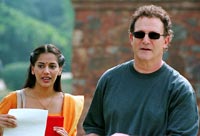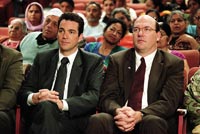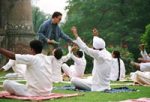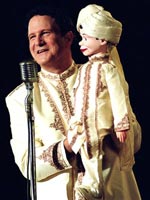Writer, director, and actor Albert Brooks says he wrestled for years with the idea of exploring the ways the world has changed since September 11, 2001, calling it the “700-pound gorilla sitting in my comedy office saying, ‘Deal with this, find a way.'” Apparently, that big ape eventually evolved into a Big Idea, because the concept for Looking for Comedy in the Muslim World is a great one. While the film doesn’t always live up to the potential of its premise, it gets high marks (and some good laughs) for even trying.

The movie opens with Brooks (playing an obtuse version of himself) in an awkward casting meeting with Penny Marshall (playing an abrasive edition of herself). Brooks confides he’s “looking for that next great acting role,” and Marshall makes it clear that he’s NOT what she’s looking for. The scene, complete with jabs at the actor’s previous work and the suggestion that perhaps he is washed-up, is quintessential Brooks, and it sets the tone of self-deprecation that will elicit laughter from some, and groans from others, throughout the movie.
Dejected, Brooks heads home and discovers a registered letter from the U.S. government. Afraid he’s been busted for visiting an Al Qaeda website (“just once, out of curiosity, for 15 minutes”), Brooks is pleasantly surprised to discover he’s being courted by the State Department. Enthusiastically encouraged by his wife, the work-hungry comedian travels to Washington, D.C. to meet with a special commission chaired by actor and former senator Fred Dalton Thompson (played, rather convincingly, by actor and former senator Fred Dalton Thompson). Thompson tells Brooks that the government recognizes its need to move beyond just the “usual stuff”—spying and fighting—in its efforts to understand other (potentially threatening) cultures. Uncle Sam wants Brooks to travel to India and Pakistan, find out what makes Muslim people laugh, and write a 500-page report detailing his findings. (When Brooks points out that India is predominantly Hindu, the commission assures him that there are still 150 million Muslims there—certainly enough to facilitate his research.) The length of the required report intimidates Brooks, but the promise of a Medal of Freedom (“the nice one … with the ribbon collar”) is too much to resist, and he agrees to the trip.

Two half-hearted State Department bureaucrats, Stuart and Mark, are assigned to accompany Brooks, and soon the three men are jammed into the coach section of a twenty-hour Air India flight. Stuart (a very funny John Carroll Lynch, best-known from Fargo and The Drew Carey Show) is a fan of Albert’s work, whereas Mark (an appropriately inscrutable John Tenney) knows little about the comedian and cares even less. (When, pressed, Mark acknowledges he has seen Brooks’ classic Lost in America. “Did you like it?” asks the filmmaker. “Parts of it,” answers Mark. “I thought the ending felt a bit tacked on.”) Both men blame the lack of first class seating on a “mix-up,” but it doesn’t take long for a disgruntled Brooks to realize nothing about the trip is going to be up to his standards. When at last he is settled into his New Delhi hotel, his phone call home reveals the benign narcissism that has accompanied him all the way across the world. He’s too busy kvetching to his wife about the flight and the absence of an embassy driver upon their arrival to report anything significant about his first visit to an exotic new place.
The next day, Stuart and Mark show Albert the office he’s been promised—a tiny, decrepit space devoid of computers or telephones. Down the hall is a call center jammed with outsourced workers, and their overheard conversations provide one of the best running gags of the movie. In need of an Indian assistant, Brooks interviews a parade of woefully under-qualified and inappropriate candidates until, miraculously, a luminous and perfectly skilled young woman named Maya (played with scene-stealing, wide-eyed charisma by Indo-American actor Sheetal Sheth) walks in and is hired on the spot. Soon, Albert and Maya are scouring the streets of New Delhi, with Albert asking bewildered and sometimes hostile locals, “What makes you laugh?” and Maya taking down their mostly evasive responses in shorthand.

Frustrated that his subjects are not very forthcoming, and daunted by the fact that there are no comedy clubs in India, Brooks gets the idea to mount his own comedy concert, which he calls The Big Show. While Maya, Stuart and Mark hand out flyers in Old Delhi, Albert follows anxiously behind them, taking the posters back from people he thinks are not likely to speak English or appreciate his comedy. The scheduled venue is a school auditorium with a microphone and spotlight but no toilets or dressing rooms. Brooks insists his handlers arrange for a tent to be set up outside where he can prepare his make-up and his material. The night of the Big Show reveals a full house inside and, outside, a nervous Brooks crammed into an absurdly tiny tipi.
Brooks’ concert for an utterly unamused Indian crowd is, depending on your taste, either a hilarious send-up of comedic conventions and show-biz self-absorption, or an excruciatingly protracted exercise in humiliation. (In short, fans of Brooks’ previous works like Real Life, Lost in America, and Defending Your Life will likely find this really funny. Viewers who didn’t like those movies probably won’t appreciate this one either.) Brooks tells his audience he’ll be performing a “wide-range of material” in an attempt to see what types of humor connect with them, but in truth his entire repertoire consists of satires of essentially American (or at least Western) comedy routines like ventriloquism and improvisation based on audience suggestions. It is, of course, ridiculous to expect an audience with no familiarity with the conventions he is lampooning to get the joke, just like it’s ridiculous to think that 300 million Muslims in India and Pakistan are all going to find the same things funny. The cultural blindness and insensitivity that renders Brooks (the character) completely hapless is the whole point of the film, and in the end it means we learn a whole lot more about the comedian—and ourselves—than we do about India or Pakistan.

The movie marches along. Brooks makes a furtive trip to Pakistan to meet with some aspiring comics and takes a meeting with the Al-Jazeera television network. He visits the Taj Mahal, but actually forgets to notice it because he is so absorbed defending his comedy approach to Stuart. He tries to counsel Maya’s jealous boyfriend Majeed, who misinterprets the affectionate but innocent relationship between the comedian and his bright assistant. The Indian and Pakistani governments also misunderstand his actions; Brooks remains as blithely clueless about political tensions as he does about cultural ones and almost starts a nuclear war in the process. Eventually, the film comes to an oddly abrupt end—stopping rather than finishing—and Brooks comes home.
Looking for Comedy in the Muslim World is not for everyone. The honchos at Sony Pictures backed out of distributing the film over its politically incorrect title; some viewers will be more likely to back away because Brooks asks us to work so hard for the laughs. But those who like their humor wry and dry will be rewarded by a nuanced study of the way self-absorption—much more than language or cultural differences—can keep people disconnected, be they comedians, governments, or you and me.
Talk About It
Discussion starters- Elsewhere, Brooks has claimed that comedy is essential to being human, that “when the time comes when there is literally no ability to extract laughs from a subject, it’s really the end of the world.” Do you agree? Are there subjects Christians should not be able to “extract laughs” from? Discuss. Some would say that many Christians are “humor-impaired.” What would you say to that charge?
- Brooks fails to transpose or reinvent any of his comedy routines for Indian culture, because he mostly fails to notice Indian culture to begin with. As a result, he fails to connect with his audience. What applications might there be here for missions work?
- Do you think this film treats the Indian and Pakistani people and cultures with respect? Why or why not?
- Brooks walks right by the Taj Mahal—one of the eight wonders of the world—and doesn’t notice it because he’s too busy talking about himself. What “wonders” have you missed because of a failure to look around?
The Family Corner
For parents to considerLooking for Comedy in the Muslim World contains no sexual or violent content and is in many respects remarkably wholesome. It does earn its PG-13 rating with a few prominently placed expletives and one scene involving drug use. It would be suitable for older children but not likely to appeal to them; it’s the obliqueness of Brooks’ humor that makes this an adult movie.
Photos © Warner Independent Pictures
Copyright © 2006 Christianity Today. Click for reprint information.
What Other Critics Are Saying
compiled by Jeffrey Overstreetfrom Film Forum, 01/26/06What happens when the U.S. government sends an American comedian to find out what makes Muslims laugh? In Looking for Comedy in the Muslim World, Albert Brooks rides this inspired presence right into India and Pakistan, and discovers that cracking this comedy code is tougher than it looks. And apparently, the film may disappoint viewers with its lack of genuine laughs. Still, as a cultural experiment, it may be worth seeing.
Mainstream critics seem to be amused, but they’re not enthusiastic.












